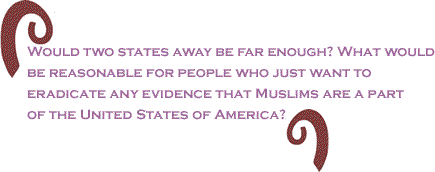| Millions
of Americans have weighed in on the proposed Islamic Center
two blocks from the site of the destroyed World Trade Center
in New York City, but few of the people who rabidly oppose
construction and the pundits and others who analyze the
debate look at the reality at street level.
We�ll
have to assume that most people who read newspapers or own
a television set and turn on the news programs once in a
while know the issue:� American Muslims want to build a
center much like your average YMCA or Jewish Community Center
two blocks from the WTC site, to be open to the general
public.� In it, there would be a mosque for worship.
The
WTC site is not visible from the proposed center and the
center is not visible from the WTC site.� So, what�s the
problem?� They�re Muslims!
Opponents
say that it�s �too close� to the site of what will be the
Freedom Tower, at the WTC location.� Newt Gingrich, former
speaker of the House of Representatives, fairly frothed
at the mouth when he described the proposal as exhibiting
�triumphalism� by Islam over the demise of the towers on
Sept. 11, 2001.

It�s
hard to say exactly how Gingrich reached his assessment,
since Muslims who are Americans, like other religious groups
before them, want to contribute something to their community,
as well as express their religious beliefs in a separate
part of the building.� Routine practice of religion (any
religion) usually does not include expressions of triumphalism
over anyone else.
But
Gingrich�s expression of outrage opened the floodgates of
vitriol over the proposed construction and millions have
taken a position against the Islamic center, to the point
that a majority of Americans (according to one poll) are
against the construction.
One
of the more important public figures involved in what was
essentially a local issue is strongly in favor of the building�s
construction�Mayor Michael Bloomberg.� The mayor has pointed
out that, in America, everyone has the right, a constitutional
right, to worship in the manner they choose and that includes
the construction of houses of worship where they choose
to build them.� And, President Obama�s statement on the
issue (the first statement) backed up Bloomberg�s position.
Although
more than 50 percent of Americans oppose the construction
of the center at the site chosen, it is not likely that
even a small percentage of them know that there is already
a place where Muslims regularly worship, just four blocks
away from the WTC site, and it�s been there since before
the World Trade Center was built.
That
fact could change the minds of many Americans, but then,
they might declare that four blocks away is too close and
demand that the place of worship be closed.
So,
the question becomes:� What is too close?� And, What is
far enough?� Is the two-block difference all right, or should
opponents be appeased by forcing the closure of the existing
mosque or worship site because it is only four blocks from
the WTC site?� It does make a difference.
However,
if four blocks is a sufficient distance, why is not two
blocks sufficient?� Looked at in this manner, it seems that
a two-block difference is cutting it a bit thin, especially
since the proposed center site is out of sight of the tower
location.
Most
of the leading opponents are also a bit thin on their rationale
for opposing the construction of the center.� They couch
their opposition in terms of �respecting the sensibilities�
of the opponents and of the families of the victims of the
attack, notwithstanding the support of building the center
on the part of a number of families of victims.

The
best beliefs and intentions of the good Christian opponents
are not on display in this matter.� Recall that in October
2006, a gunman entered West Nickel Mines School, an Amish
school in Lancaster County, Pa., and systematically shot
ten girls, killing five, before he killed himself.
The
response of the Amish community stunned most of the country,
if not the world, when they, collectively, forgave the gunman,
himself a husband and father of three, and made peace with
his family and joined them in expressing their profound
sorrow for the loss of life.
The
families and community of the slain children did not blame
the other members of whatever religious group to which the
gunman belonged.� They rightfully saw it as a tragedy for
everyone involved.� It was not the fault of the killer�s
parents or his other family members, so the Amish did not
blame them.
One
Amish father said at the time that he, the gunman, was a
husband and father, that he possessed a soul and that he
was now standing before a just god.� The school was demolished
and a new school was built a short distance away and named
The New Hope School.� It opened six months after the shootings.
There�s
very little chance that the nation or the world would be
stunned by the response of the opponents of the Islamic
center in New York City.� Whatever else it is, the response,
beginning with Gingrich, demonstrates a lust for revenge.

If
four blocks is a sufficient distance away for an existing
worship site and two blocks is not far enough for the proposed
center, how far is enough?� Would 10 blocks be enough?�
Would two states away be far enough?� What would be reasonable
for people who just want to eradicate any evidence that
Muslims are a part of the United States of America?�
It�s
not that opponents could ever be satisfied, but they never
have said how far would be enough for them.� Don�t expect
any specific requirements from them anytime soon, because
that begins to tread on their own religions.� If they could
dictate how, when, and where others might practice their
religions, someone might be taking a closer look at their
own religious practices.� Some Christians believe in Christ�s
admonition to �love thine enemy.�� Gingrich and his followers
apparently don�t even love people who are not their enemies.
For
many opponents, building the center in Baghdad probably
would be far enough, as long as it didn�t come too close
to the Green Zone.
BlackCommentator.com
Columnist, John Funiciello, is a labor organizer and former
union organizer. His union work started when he became a
local president of The Newspaper Guild in the early 1970s.
He was a reporter for 14 years for newspapers in New York
State. In addition to labor work, he is organizing family
farmers as they struggle to stay on the land under enormous
pressure from factory food producers and land developers.
Click here
to contact Mr. Funiciello. |

